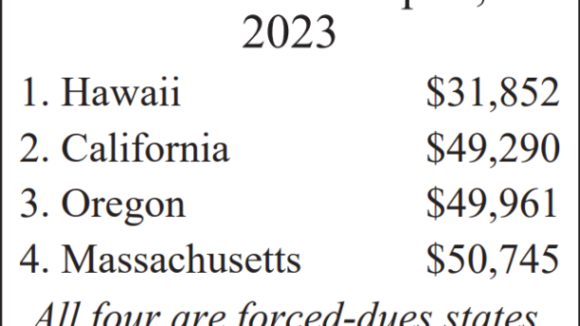The UAW, which purchased among other things, a golf course with members dues money, appears to be hitting the financial skids.
A bloated management, run-away costs, declining market share, imploding volume, a sell-off of assets and investments, headquartered in Detroit – what is it? No, it’s none of the Detroit automakers. It is their former nemesis and current co-owner, the United Auto Workers.
“Two years after the wrenching restructuring of the U.S. auto industry and the bankruptcies that remade General Motors and Chrysler, the UAW is facing its own financial reckoning. America’s richest union has been living beyond its means and running down its savings, an analysis of its financial records shows. Unless King and other officials succeed with a turnaround plan still taking shape, the next financial crisis in Detroit may not be at one of the automakers but at the UAW itself.”
This is the beginning of a special report written by the best in the reporting business, by Deepa Seetharaman and her boss, Kevin Krolicki, Chief of the Detroit Bureau of Reuters, with the help of their team of combat reporters from the Detroit front-lines.
“The UAW might have three to five years before its budget difficulties forced a financial crunch, absent changes. The “hand-grenade” math of the projection gave the union less than a five-year window of opportunity to turn things around by winning new membership at foreign-run auto plants, said the person who saw the internal forecast and asked not to be named because of its sensitivity.”
In many ways, the UAW resembles the companies it opposed for so long. The UAW is America’s richest union. One of its biggest assets is its strike fund, which stood at $763 million at the end of 2010. If push comes to shove, a union is as strong as its strike fund. The trouble is: The UAW spends more than it takes in. Increasingly, the union has to dip into the strike fund, the Reuters report says. According to government filings, the UAW liquidated $222 million of investments from 2007 to 2009 to cover the shortfall between expenses and revenue.
Mirroring the U.S. auto industry, the union has seen better days. UAW membership dropped from its peak of 1.5 million in 1979 by 75 percent to under 377,000 workers. Less than a third of the membership works at the Detroit Three.
Membership fees dropped even more. Union workers still pay dues equivalent to two hours of work a month. The two-tier pay deal, negotiated in 2007, may have helped to stop an even larger membership erosion. But the membership fee is only $30 a month now.
Mirroring the U.S. auto industry, the UAW is spending heavily to get sagging volume back up. The union needs new members even more desperately that the Detroit Three need new customers. Says Reuters:
“In 2006, UAW delegates voted to move about $110 million from the strike fund to pay for organizing. In 2010, King went back for an unprecedented double-dip in the fund and won clearance to spend up to another $160 million over four years.
If that bet goes bust, the union squandered the bargaining power of its members. The odds are not good. “The only luck we’ve had has been bad luck,” UAW boss Bob King said last year. The UAW wants to get members at the transplants in the south. A risky gamble. Says Reuters:
“Volkswagen AG is paying newly hired workers at its Chattanooga, Tennessee plant $14.50 per hour. That is almost exactly what a second-tier UAW worker would make in Detroit. In a sign of demand for jobs at that pay level, the Chattanooga plant had 85,000 applications for more than 2,000 jobs. VW workers have been promised $19.50 after three years on the job. That is just above the $19.28 per hour maximum that entry-level workers at GM would make over the term of the four-year contract now before workers for ratification.”
Why pay dues if they don’t buy you more?
Gary Chaison, a labor relations professor at Clark University in Worcester, Massachusetts, figures that organizing Chattanooga could cost the UAW up to $3 million, or some $1,500 per worker. It would take the union over four years to recoup its investment – if they win.
If that bet is not successful, then at some point, someone will have to bail out the UAW – again. No thanks, no UAW deathwatch.


